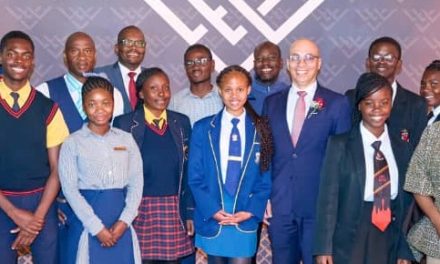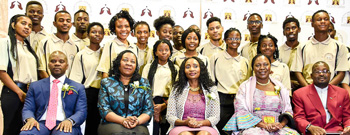
Bushmen join education mainstream

Moses Khumub from WIMSA/NSC, Elfriede Gaeses from WIMSA, Ambassador of Finland, H.E Anne Saloranta, and Elsarien Katiti the director of proceedings launching the Namibian San Council pamphlet on “Inclusive education for San children in Namibia” in the capital this week. (Photograph by Comfort Ajibola)
She stated that while calling for action to address the multiple barriers that keep children, in particular San children, out of school, the brochure puts the spotlight on a number of articles in the constitution, on policies and on international agreements that Namibia is part of, that promote the right to education for the San children. “On their own these policies and international agreements can not promote the right to education for the San children,” she said adding. “I am happy to note that the brochure will be translated into various San languages so that the San themselves are also on the forefront of fighting for their rights” The document was launched by the Ambassador of Finland, H.E Anne Saloranta, who said “the Embassy of Finland has funded WIMSA for a two-year project to promote education for indigenous children and to strengthen the structures and operations of the Namibia San Council.” As the project now comes to its conclusion, she mentioned that its ultimate goal has been to contribute to bridging the gap between policy and practice. “It has examined systems that are intended for inclusive education” she said. “The activities of the project included among others the support of the ECD Centres, capacity building to communities through the members of the San council and support for San students from primary to tertiary levels.”
She explained that the embassy’s support for indigenous minorities comes from the Fund for Local Cooperation, which is a funding instrument administered by the Embassy of Finland guided by the Finnish Government Development Policy,
“The policy aims at eradication of extreme poverty and emphasizes equal rights and opportunities for everyone regardless of their race, gender and status. One of the cross-cutting themes of the Finnish Government support for development is reduction of inequality. Particular attention is paid to the rights and equal participation opportunities of people who are vulnerable, socially excluded and discriminated against. WIMSA is one of the organizations here in Namibia that operate among the indigenous San minorities who are at risk of the above-mentioned.” She added “a key area of educational support in the San communities is improving the school enrollment of San children, among whom the school drop-out rate is higher than among the mainstream population. Due to cultural and language barriers, the San Children can face a higher risk of dropping out of school, which makes them more vulnerable to social exclusion later on.”
“Extra support and care is needed to help these children [with] schooling and studying. It is crucial that community members understand the importance of education so that the children have the support from the community to continue attending lessons. Educated members of the San communities could act as role models to set a positive example of successful individuals who have prospered by taking their education seriously,” the Ambassador said.











































